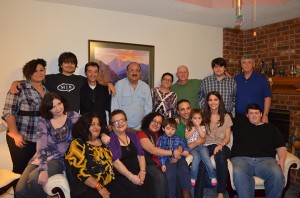
Courtesy Photo
By Rebecca Fiedler
Staff Writer
Those driving down Bosque Boulevard might notice a large sign at the intersection of 25th Street that reads “Waco Baha’i Center” standing over what was, years ago, a pharmacy. Baha’is have been a part of Waco for more than 50 years, and to this day, people of the Baha’i faith are still active in the Waco community.
Baha’i is a religion that was founded in the 1800s by Bahá’u’lláh in what is present-day Iran. The religion focuses on the importance of unity and equality among human beings, and teaches that the major religions of the world represent different stages in the central revelation of God’s will.
Major religious leaders such as Jesus, Mohammed, Buddha and Krishna are believed by Baha’is to be divine messengers sent by God.
“Baha’is accept all religions that came before Baha’i because Bahá’u’lláh said we have to, because we’re all messengers of God,” said Bill Irving, a member of the Waco Baha’i Spiritual Assembly.
Jo Welter is the board chair of the Community Race Relations Coalition in Waco and has been a Baha’i since she was a teenager in the 1970s.
“There are some Baha’is in Waco who are seventh generation Baha’is,” Welter said. “Then there are people, like me, who became Baha’is as adults.”
Welter said she once practiced Catholicism and first thought the Baha’i faith was satanic. Welter researched the religion to prove its teachings were wrong, but felt convinced otherwise and converted.
“On an intellectual level, it made sense to me,” Welter said. “It’s very logical. And then on another level, it fulfilled what I believed as a Christian. And then on another level, which is at the point where I became a Baha’i … I really knew in the depths of my soul that Bahá’u’lláh is who he says he is.”
Dr. A. Christian van Gorder is an associate professor in the department of religion and teaches world religion classes.
“Most people don’t know the Baha’i,” van Gorder said. “They don’t understand the Baha’i. I don’t think the Baha’i in North America have had any particular problem with persecution. It’s just a matter of neglect and misunderstanding.”
Van Gorder said he feels that many people do not know about the existence of the Baha’i faith because of apathy.
“They’re right there in the middle of Waco, and people drive by that place all the time, but there are very few people who ask the questions about who the Baha’is are and where they come from,” he said.
For the Baha’is of Waco, devotional services are held at the Baha’i Center each Sunday, where local members of the faith discuss religious readings together.
This practice is not done in every Baha’i community, Welter said, though all Baha’i peoples celebrate something called Feast every 19 days, where there are devotional discussions, spiritual assemblies and fellowship amongst members.
Welter said she feels the Waco Baha’i community is diverse.
“It’s completely diverse in the standpoint of race and culture,” she said. “With age it ranges down to people who are about 20.”
The Baha’is in Waco are active members of what is now the Greater Waco Interfaith Conference, Welter said.
Years ago the Interfaith Conference was called the Waco Conference for Christians and Jews, but now the group is opened up to all religions, she said.
“It just seems like people are getting more comfortable with each other,” Welter said.
Van Gorder said fighting racism is critical to the Baha’i faith, which is why the Waco Baha’i are involved with the coalition of Waco.
“They’re active in the community and well-respected and influential beyond their size,” he said. “It’s a small community with a large footprint.”
Welter said generally the Baha’is’ relationship with the Waco Christian community is good, though there have been instances of exclusion of the Baha’is. The coalition in Waco partners with Baylor in multiple events, and a couple of years ago, Welter said, the coalition partnered with Baylor over a church swap, where members of an African American church and white church were swapped in order to promote positive race relations.
At a Christian community event called the No Need Among You Conference, sponsored by organizations like Mission Waco and Baylor, the coalition was going to report about the results of the church swap.
Welter said she received a call from a Baylor employee working on the event, informing Welter that she would not be invited to speak at the event because she was Baha’i.
“Their tagline is ‘excluding the excluded,’ and yet they’re being exclusive on another level,” Welter said. “They want to include those who are excluded because of poverty, homelessness and things like that. It’s okay to discriminate because of things like religion, but not because somebody’s poor. It just seems kind of ludicrous to me.”
Welter said, however, she has had positive experiences with organizations and institutions like Baylor.
Every semester she and her husband are invited to Baylor to talk to world religion classes.
“I really appreciate that about Baylor,” she said. “Some of the religion professors take the time to have the people who are practicing different religions come and share with the students.”
Van Gorder said most of his students love the Welters when the couple comes to talk during his class.
“At first they’re mystified,” he said. “At first they don’t understand. But after the presentations that Jo and her husband give, they become very interested and have a lot of questions and follow-up. They go to Baha’i services and email Jo Welter and learn more about her. She’s a former Christian who converted to the Baha’i faith, and that intrigues some students. Students are very positive toward them. Baylor students, when you give them the opportunity, will jump at opportunities to learn. I don’t think the problem is with the students. I think it’s with the curriculum, which is certainly not to the center.”



